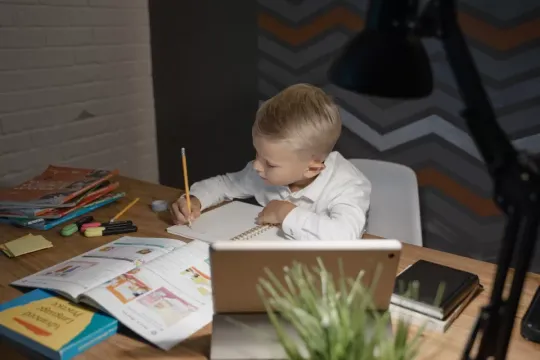Activities to improve the English vocabulary of elementary school children

Most people think that children are sponges and there is no limit to the number of words they can absorb and memorize, but is that really the case?
It is not so easy for most children to learn a second or third language, to retain the vocabulary and to reuse it at the right time or when well-meaning aunts or grandparents quiz them in English. Many parents and teachers will tell you that for some children remembering what they have learned in English class is a real challenge, especially if the words are totally out of context.
Unless you've reviewed them a few times, your child will probably struggle to remember the colors or farm animals that seemed so easy in English class. So what are the best language tools to enrich the English vocabulary of elementary school children and to help them retain and reuse words when they need them?
Interest the child
To help children memorize vocabulary, it is of the utmost importance to arouse their interest. So don't ask them to sit down in front of a list of irregular verbs and learn them by heart by repeating them like parrots until they remember them, otherwise they will end up hating English. It is much more entertaining to have them participate in a game or tell them an interesting anecdote.
Emphasizing or underlining key words, then reminding them or repeating them, is an effective linguistic tool for drawing their attention to vocabulary. That's why stories are great for introducing your child to a new language and keeping them interested in the content, thanks to the pictures or color illustrations.
When children particularly like a tale, they inevitably end up knowing the words and phrases by heart because the vocabulary is used in a very clear context. There are many word-based activities that complement Learn English Kids stories. You can also find lots of interesting visuals and stories to expand the range of words your child already knows on the Oxford Owl website.
However, that doesn't mean that memorization is necessarily a bad strategy when it comes to remembering key words and phrases. In fact, repetition is essential in language learning because it frees the mind and allows you to focus on other words without having to worry about those that are already memorized. There are lots of fun language tools to memorize vocabulary, such as songs, diction exercises and games.
Indeed, if your child wants to become a rap singer, why not invest in a cap and lead him on the path to success by letting him rap in English? Rapper is a great language tool for automating vocabulary. Why not watch some Jason Ravine YouTube videos? He is also known as Fluency MC and created a whole series of funny raps on words, adjectives, simple imperfect verbs, etc.
Personalize
We tend to remember mostly what directly concerns us and the same is true for children. If you can make a connection between the vocabulary topic and the child, then there is a much better chance that he will remember the various elements of this topic. This means that if you approach the subject of animals, you must focus on those that the child likes, those that he does not like or those that he would like to have. What animals did he see in the park? Can he tell you, for example, which animals have their classmates?
To help your children remember what they have learned, it is very effective to adopt a daily routine by having them play with words. Let's say your kids normally do their homework on the kitchen table, use this place to play some vocabulary games. You don't have to use technology consistently. Sometimes playing a 10-minute matching game or matching cards where words are written with cards that have pictures helps break the routine of homework and revise vocabulary before starting. actually doing homework!
Apps and technology to enrich your child's vocabulary
Let's not forget the technology! Most of our kids are pretty good at using tablets and if you've taken care to put the proper parental controls in place, they can pick up a lot of vocabulary just by spending ten minutes a day on their tablets.
While of course, care must be taken not to let them spend too much time on their screens, game applications can make learning more fun. These linguistic tools promote interaction and repetition of vocabulary in a fun way. Learning vocabulary in an entertaining way is the aim of the many apps for children designed by the British Council.
You can encourage them to show you their computer skills by encouraging them to create their own digital flashcards. This website also allows you to insert images on the mnemonic cards so that even the youngest can use or create them.
The advantage is that you can also print the flashcards created by your child and use them when you play memory games with him. These language tools really give children a sense of taking charge of their own learning. So, if they want to create flashcards of football teams for the next World Cup, let them! This will be a great way to get them to review countries and nationalities in English!